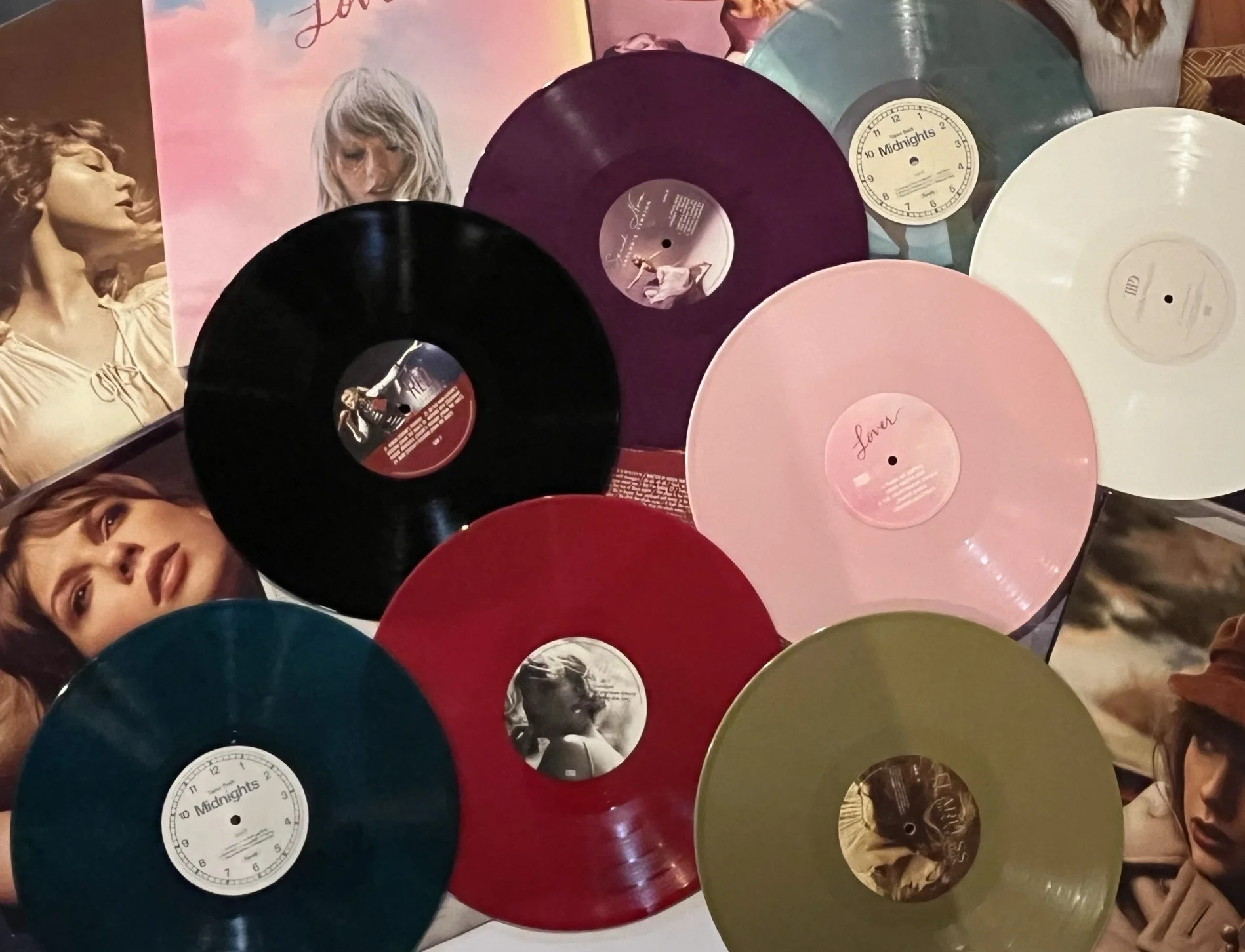Vinyl Variants Raise Questions about the Art of Music
Pictured are various vinyls in Swift's discography, all offering something different through artwork or design. Photo by Shane Mulvey '28
On Oct. 3, Taylor Swift released her 12th studio album, “The Life of a Showgirl,” produced with longtime collaborators Max Martin and Shellback. The 12-track record explores the highs and lows of fame, love after heartbreak and show business, marking Swift’s first reunion with Martin since her 2017 album “Reputation.”
Since her appearance and announcement on the football podcast “New Heights” hosted by Travis and Jason Kelce, anticipation towards the album was high. Now, “The Life of a Showgirl” is available in different vinyl variants, deluxe packages, exclusive bonus tracks and special artwork, offering listeners a range of new and collectible formats.
Releasing several variants allows for Swift to not only boost sales but also help maintain the album's position on the charts. Allowing listeners to access special demo recordings of songs, acoustic versions and a whole new photoshoot keeps fans engaged in a new presentation of the album.
With each edition offering unique features and limited availability, many listeners and fans alike purchase multiple variants. However, this trend prompts questions about whether the focus on collectible formats is overshadowing the music itself.
It's a big topic that has been brought up with many different artists, but this isn't the first time Swift's name has been mentioned.
Following the release of her eighth studio album “Folklore,” which included eight vinyl variants and a deluxe cassette, each featured different cover art and vinyl colors. “The Life of a Showgirl” surpasses “Folklore” with 34 different variants spread across CDs, vinyls and digital downloads.
“She has a fan base of people that will buy as many variants as humanly possible because they want her to break the record that Taylor herself is also very eager to be breaking,” said TikTok user Aiden Watson in a video. Fans love to support their favorite artist in anything they do as a way to show the connection they’ve built with the artist and their work.
Taylor Swift’s fanbase, who are also known as “Swifties,” have mixed opinions on the variants. Some view the special editions and alternative covers as a different insight into the album at large, while others see it as a cash grab. A large fan base like Swift’s can increase sales of most products she puts out, guaranteeing sales on any variant.
“It can overshadow it [the music] because people are more focused on collecting all of them than the actual music,” said Ava Moylan ‘28, bringing a new perspective on how fans might react to the various editions being released.
Fans feel that they’re not able to access the whole album at large because of all the different editions bringing forth something new each time. Some like to measure loyalty to artists based on how many variants they own, leaving some fans feeling like they're not devoted to the artist.
“This is so upsetting. I love Taylor, I do. But for the love of God why do you need so many variants? Why does one hard working fan have to buy seven different versions of an album instead of just having all of the songs be on one complete album? You have millions of dollars. Give us broke fans a break,” said Instagram user jessa_2292, stressing how fans struggle to keep up with all the different variants.
Many artists, when they can, release different variants of their albums. While some fans grab the variant the second it's available, others skip out to save money on the standard album they already own.
Vinyls and special editions typically range from $40 to $60, making them unaffordable for fans who can’t spend that much each time a new version is released. As a result, some listeners may feel excluded from enjoying music by their favorite artists, as these releases become highly exclusive and expensive.
In recent years, a growing number of music fans have begun to push back against the wave of deluxe releases and special editions flooding the market. Many listeners argue that the focus has shifted away from the artistry and emotion behind the music and toward profit and chart performance.
The resurgence of vinyl has played a key role in this cultural shift. While the rise of limited-edition vinyl variants has brought joy to collectors, offering new ways to experience, display and cherish their favorite albums, it’s also sparked frustration among fans who feel the music industry is exploiting nostalgia for commercial gain.
As the line between art and commerce continues to blur, the future of music consumption may hinge on balance. Artists and labels could face increasing pressure to prove authenticity through how they release and market their work. While collectors will likely continue to celebrate exclusive editions
